HRM Report: Challenges and Technology for Sri Lanka's Plantation
VerifiedAdded on 2023/05/29
|9
|1777
|106
Report
AI Summary
This report critically analyzes the existing people challenges in Sri Lanka's plantation industry, including high employee turnover and labor shortages. It explores methods to improve the socio-economic factors of the plantation community, focusing on education, housing, and income inequality. The report also identifies areas for applying technology, such as precision agriculture, drones, IoT, and AI, to improve labor productivity. It references various studies and initiatives aimed at modernizing the agricultural sector in Sri Lanka and recommends strategies for overcoming the slow adoption of new technologies, ultimately aiming to enhance the industry's sustainability and competitiveness. Desklib provides access to this report and many other solved assignments for students.
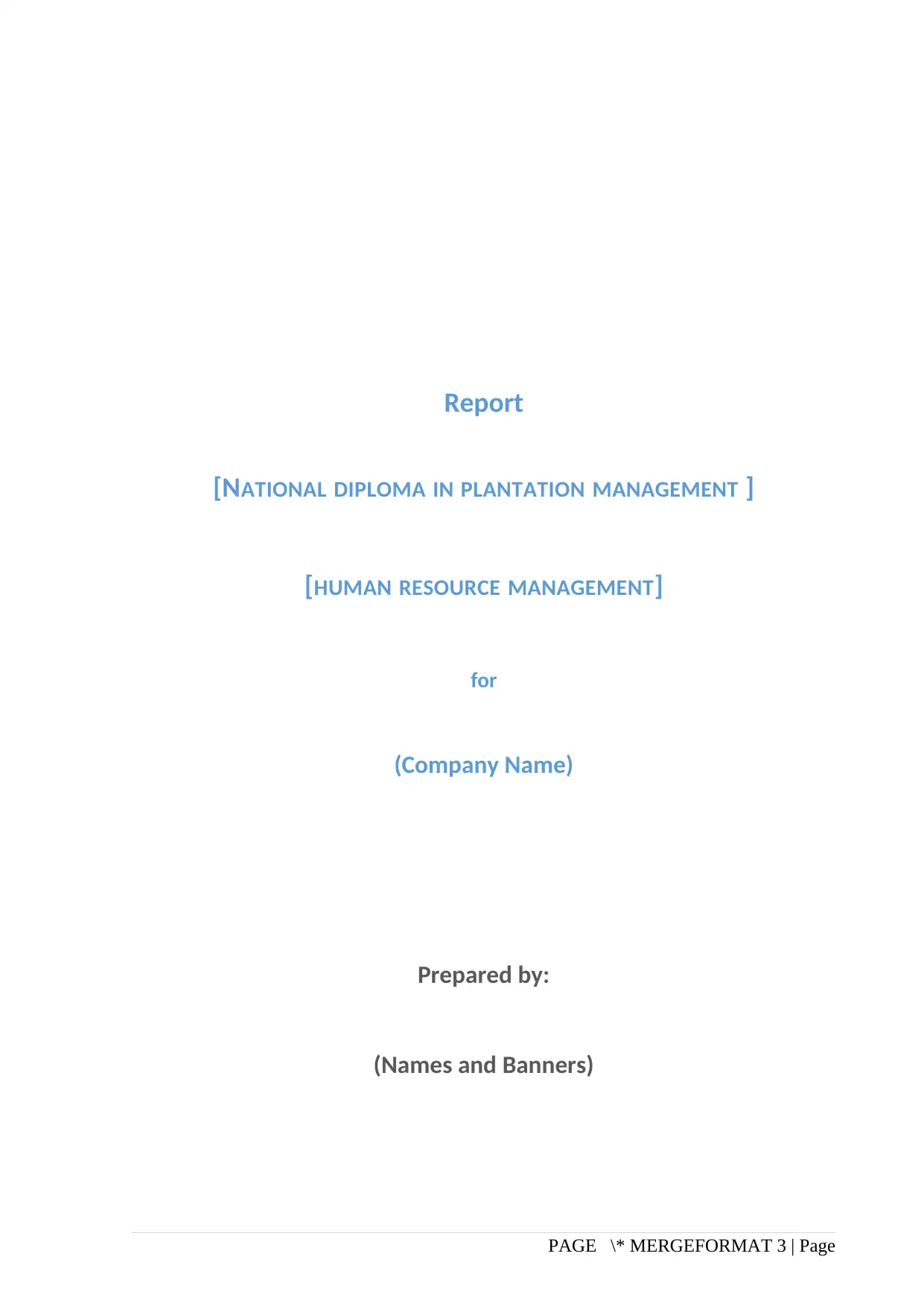
Report
[NATIONAL DIPLOMA IN PLANTATION MANAGEMENT ]
[HUMAN RESOURCE MANAGEMENT]
for
(Company Name)
Prepared by:
(Names and Banners)
PAGE \* MERGEFORMAT 3 | Page
[NATIONAL DIPLOMA IN PLANTATION MANAGEMENT ]
[HUMAN RESOURCE MANAGEMENT]
for
(Company Name)
Prepared by:
(Names and Banners)
PAGE \* MERGEFORMAT 3 | Page
Paraphrase This Document
Need a fresh take? Get an instant paraphrase of this document with our AI Paraphraser
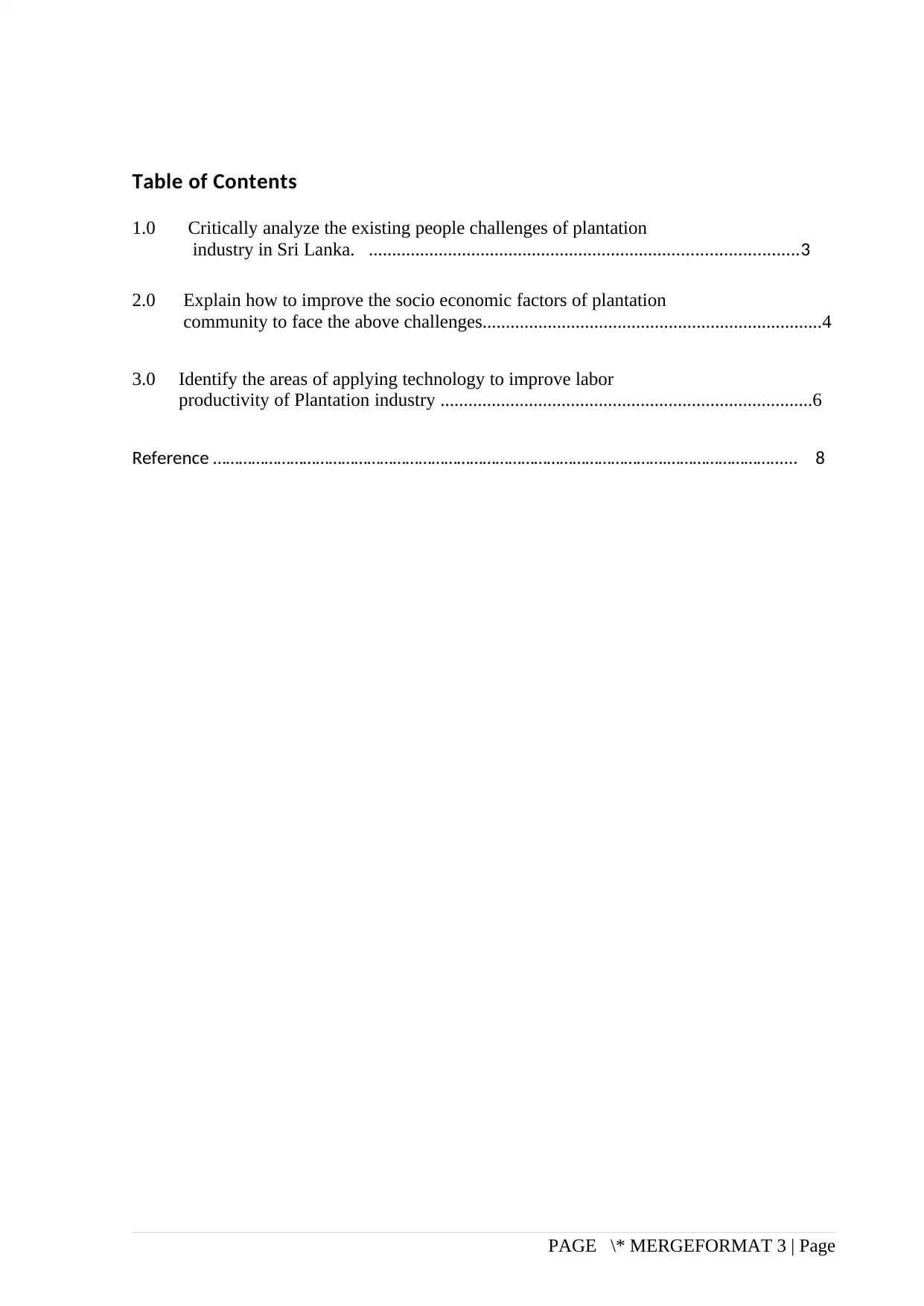
Table of Contents
1.0 Critically analyze the existing people challenges of plantation
industry in Sri Lanka. ............................................................................................3
2.0 Explain how to improve the socio economic factors of plantation
community to face the above challenges.........................................................................4
3.0 Identify the areas of applying technology to improve labor
productivity of Plantation industry ................................................................................6
Reference …………………………………………………………………………………………….……………………...... 8
PAGE \* MERGEFORMAT 3 | Page
1.0 Critically analyze the existing people challenges of plantation
industry in Sri Lanka. ............................................................................................3
2.0 Explain how to improve the socio economic factors of plantation
community to face the above challenges.........................................................................4
3.0 Identify the areas of applying technology to improve labor
productivity of Plantation industry ................................................................................6
Reference …………………………………………………………………………………………….……………………...... 8
PAGE \* MERGEFORMAT 3 | Page
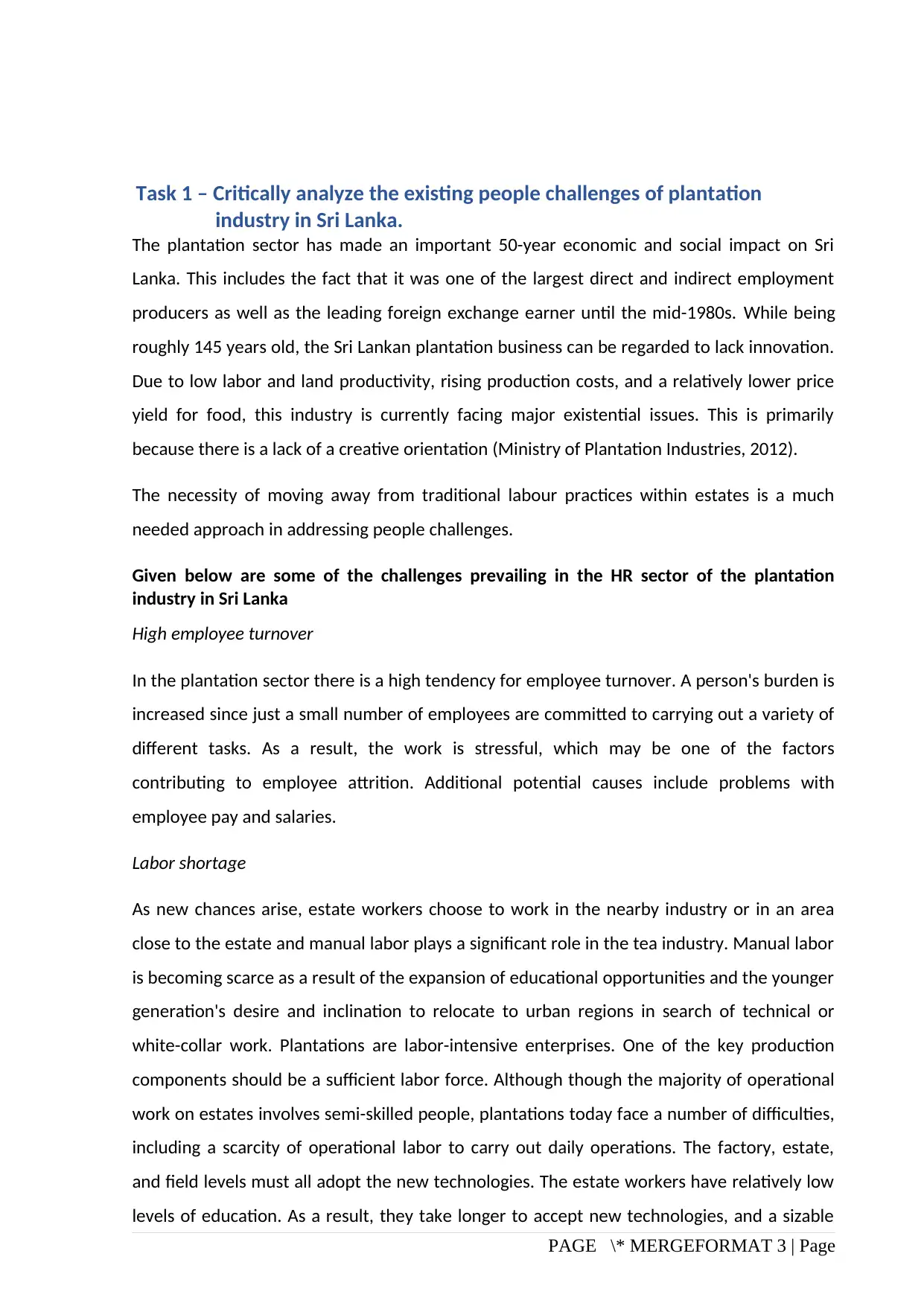
Task 1 – Critically analyze the existing people challenges of plantation
industry in Sri Lanka.
The plantation sector has made an important 50-year economic and social impact on Sri
Lanka. This includes the fact that it was one of the largest direct and indirect employment
producers as well as the leading foreign exchange earner until the mid-1980s. While being
roughly 145 years old, the Sri Lankan plantation business can be regarded to lack innovation.
Due to low labor and land productivity, rising production costs, and a relatively lower price
yield for food, this industry is currently facing major existential issues. This is primarily
because there is a lack of a creative orientation (Ministry of Plantation Industries, 2012).
The necessity of moving away from traditional labour practices within estates is a much
needed approach in addressing people challenges.
Given below are some of the challenges prevailing in the HR sector of the plantation
industry in Sri Lanka
High employee turnover
In the plantation sector there is a high tendency for employee turnover. A person's burden is
increased since just a small number of employees are committed to carrying out a variety of
different tasks. As a result, the work is stressful, which may be one of the factors
contributing to employee attrition. Additional potential causes include problems with
employee pay and salaries.
Labor shortage
As new chances arise, estate workers choose to work in the nearby industry or in an area
close to the estate and manual labor plays a significant role in the tea industry. Manual labor
is becoming scarce as a result of the expansion of educational opportunities and the younger
generation's desire and inclination to relocate to urban regions in search of technical or
white-collar work. Plantations are labor-intensive enterprises. One of the key production
components should be a sufficient labor force. Although though the majority of operational
work on estates involves semi-skilled people, plantations today face a number of difficulties,
including a scarcity of operational labor to carry out daily operations. The factory, estate,
and field levels must all adopt the new technologies. The estate workers have relatively low
levels of education. As a result, they take longer to accept new technologies, and a sizable
PAGE \* MERGEFORMAT 3 | Page
industry in Sri Lanka.
The plantation sector has made an important 50-year economic and social impact on Sri
Lanka. This includes the fact that it was one of the largest direct and indirect employment
producers as well as the leading foreign exchange earner until the mid-1980s. While being
roughly 145 years old, the Sri Lankan plantation business can be regarded to lack innovation.
Due to low labor and land productivity, rising production costs, and a relatively lower price
yield for food, this industry is currently facing major existential issues. This is primarily
because there is a lack of a creative orientation (Ministry of Plantation Industries, 2012).
The necessity of moving away from traditional labour practices within estates is a much
needed approach in addressing people challenges.
Given below are some of the challenges prevailing in the HR sector of the plantation
industry in Sri Lanka
High employee turnover
In the plantation sector there is a high tendency for employee turnover. A person's burden is
increased since just a small number of employees are committed to carrying out a variety of
different tasks. As a result, the work is stressful, which may be one of the factors
contributing to employee attrition. Additional potential causes include problems with
employee pay and salaries.
Labor shortage
As new chances arise, estate workers choose to work in the nearby industry or in an area
close to the estate and manual labor plays a significant role in the tea industry. Manual labor
is becoming scarce as a result of the expansion of educational opportunities and the younger
generation's desire and inclination to relocate to urban regions in search of technical or
white-collar work. Plantations are labor-intensive enterprises. One of the key production
components should be a sufficient labor force. Although though the majority of operational
work on estates involves semi-skilled people, plantations today face a number of difficulties,
including a scarcity of operational labor to carry out daily operations. The factory, estate,
and field levels must all adopt the new technologies. The estate workers have relatively low
levels of education. As a result, they take longer to accept new technologies, and a sizable
PAGE \* MERGEFORMAT 3 | Page
⊘ This is a preview!⊘
Do you want full access?
Subscribe today to unlock all pages.

Trusted by 1+ million students worldwide
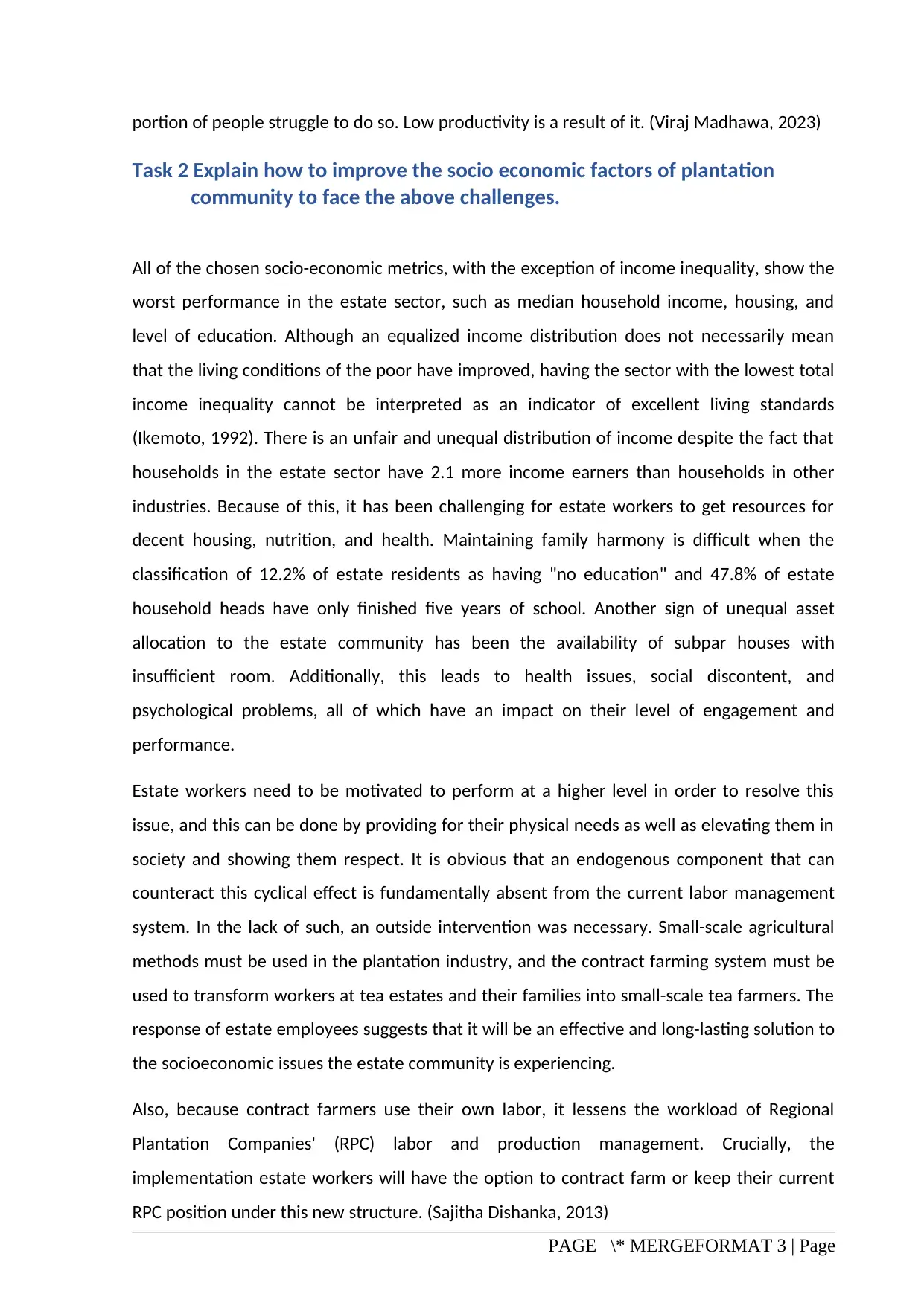
portion of people struggle to do so. Low productivity is a result of it. (Viraj Madhawa, 2023)
Task 2 Explain how to improve the socio economic factors of plantation
community to face the above challenges.
All of the chosen socio-economic metrics, with the exception of income inequality, show the
worst performance in the estate sector, such as median household income, housing, and
level of education. Although an equalized income distribution does not necessarily mean
that the living conditions of the poor have improved, having the sector with the lowest total
income inequality cannot be interpreted as an indicator of excellent living standards
(Ikemoto, 1992). There is an unfair and unequal distribution of income despite the fact that
households in the estate sector have 2.1 more income earners than households in other
industries. Because of this, it has been challenging for estate workers to get resources for
decent housing, nutrition, and health. Maintaining family harmony is difficult when the
classification of 12.2% of estate residents as having "no education" and 47.8% of estate
household heads have only finished five years of school. Another sign of unequal asset
allocation to the estate community has been the availability of subpar houses with
insufficient room. Additionally, this leads to health issues, social discontent, and
psychological problems, all of which have an impact on their level of engagement and
performance.
Estate workers need to be motivated to perform at a higher level in order to resolve this
issue, and this can be done by providing for their physical needs as well as elevating them in
society and showing them respect. It is obvious that an endogenous component that can
counteract this cyclical effect is fundamentally absent from the current labor management
system. In the lack of such, an outside intervention was necessary. Small-scale agricultural
methods must be used in the plantation industry, and the contract farming system must be
used to transform workers at tea estates and their families into small-scale tea farmers. The
response of estate employees suggests that it will be an effective and long-lasting solution to
the socioeconomic issues the estate community is experiencing.
Also, because contract farmers use their own labor, it lessens the workload of Regional
Plantation Companies' (RPC) labor and production management. Crucially, the
implementation estate workers will have the option to contract farm or keep their current
RPC position under this new structure. (Sajitha Dishanka, 2013)
PAGE \* MERGEFORMAT 3 | Page
Task 2 Explain how to improve the socio economic factors of plantation
community to face the above challenges.
All of the chosen socio-economic metrics, with the exception of income inequality, show the
worst performance in the estate sector, such as median household income, housing, and
level of education. Although an equalized income distribution does not necessarily mean
that the living conditions of the poor have improved, having the sector with the lowest total
income inequality cannot be interpreted as an indicator of excellent living standards
(Ikemoto, 1992). There is an unfair and unequal distribution of income despite the fact that
households in the estate sector have 2.1 more income earners than households in other
industries. Because of this, it has been challenging for estate workers to get resources for
decent housing, nutrition, and health. Maintaining family harmony is difficult when the
classification of 12.2% of estate residents as having "no education" and 47.8% of estate
household heads have only finished five years of school. Another sign of unequal asset
allocation to the estate community has been the availability of subpar houses with
insufficient room. Additionally, this leads to health issues, social discontent, and
psychological problems, all of which have an impact on their level of engagement and
performance.
Estate workers need to be motivated to perform at a higher level in order to resolve this
issue, and this can be done by providing for their physical needs as well as elevating them in
society and showing them respect. It is obvious that an endogenous component that can
counteract this cyclical effect is fundamentally absent from the current labor management
system. In the lack of such, an outside intervention was necessary. Small-scale agricultural
methods must be used in the plantation industry, and the contract farming system must be
used to transform workers at tea estates and their families into small-scale tea farmers. The
response of estate employees suggests that it will be an effective and long-lasting solution to
the socioeconomic issues the estate community is experiencing.
Also, because contract farmers use their own labor, it lessens the workload of Regional
Plantation Companies' (RPC) labor and production management. Crucially, the
implementation estate workers will have the option to contract farm or keep their current
RPC position under this new structure. (Sajitha Dishanka, 2013)
PAGE \* MERGEFORMAT 3 | Page
Paraphrase This Document
Need a fresh take? Get an instant paraphrase of this document with our AI Paraphraser
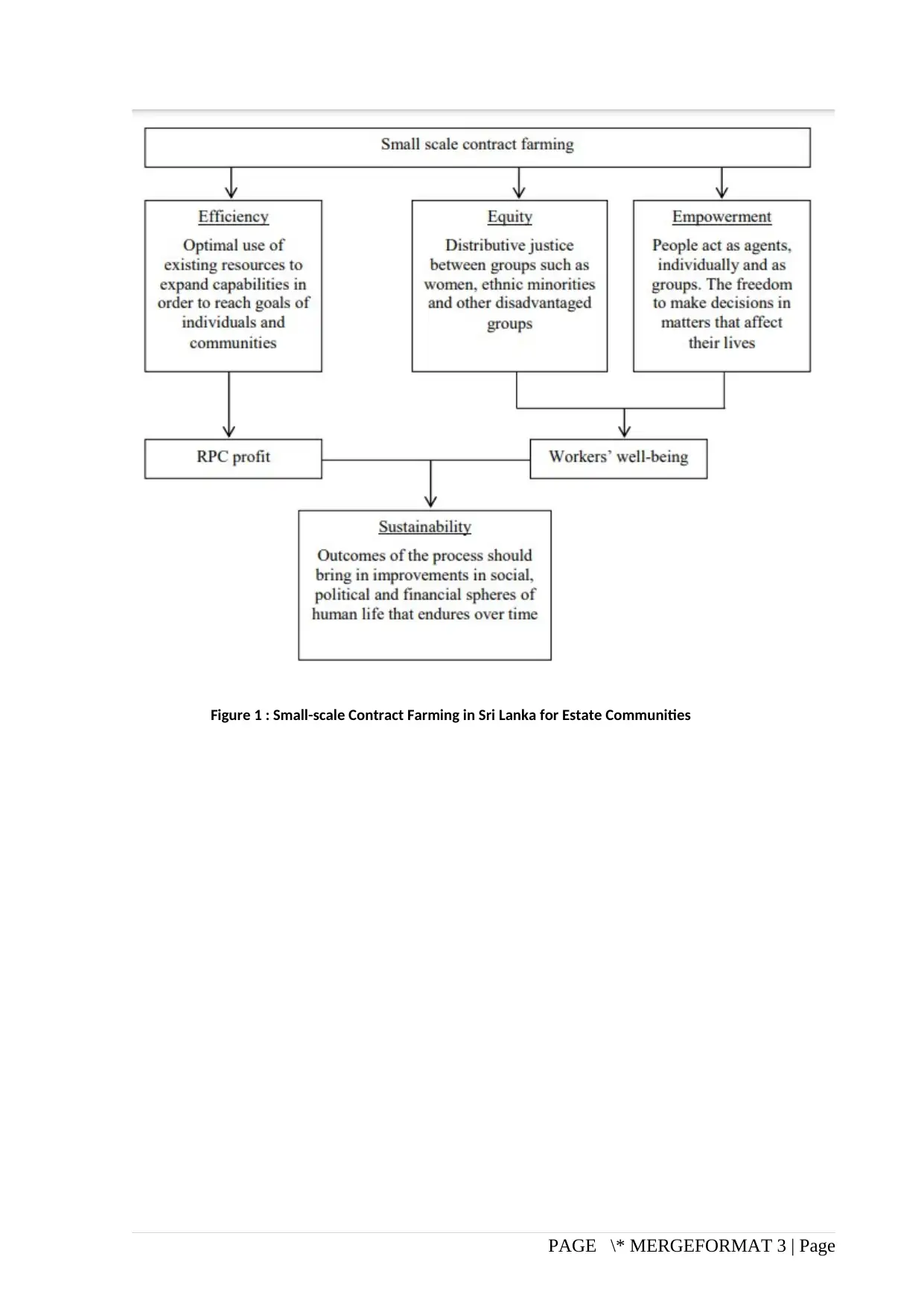
Figure 1 : Small-scale Contract Farming in Sri Lanka for Estate Communities
PAGE \* MERGEFORMAT 3 | Page
PAGE \* MERGEFORMAT 3 | Page
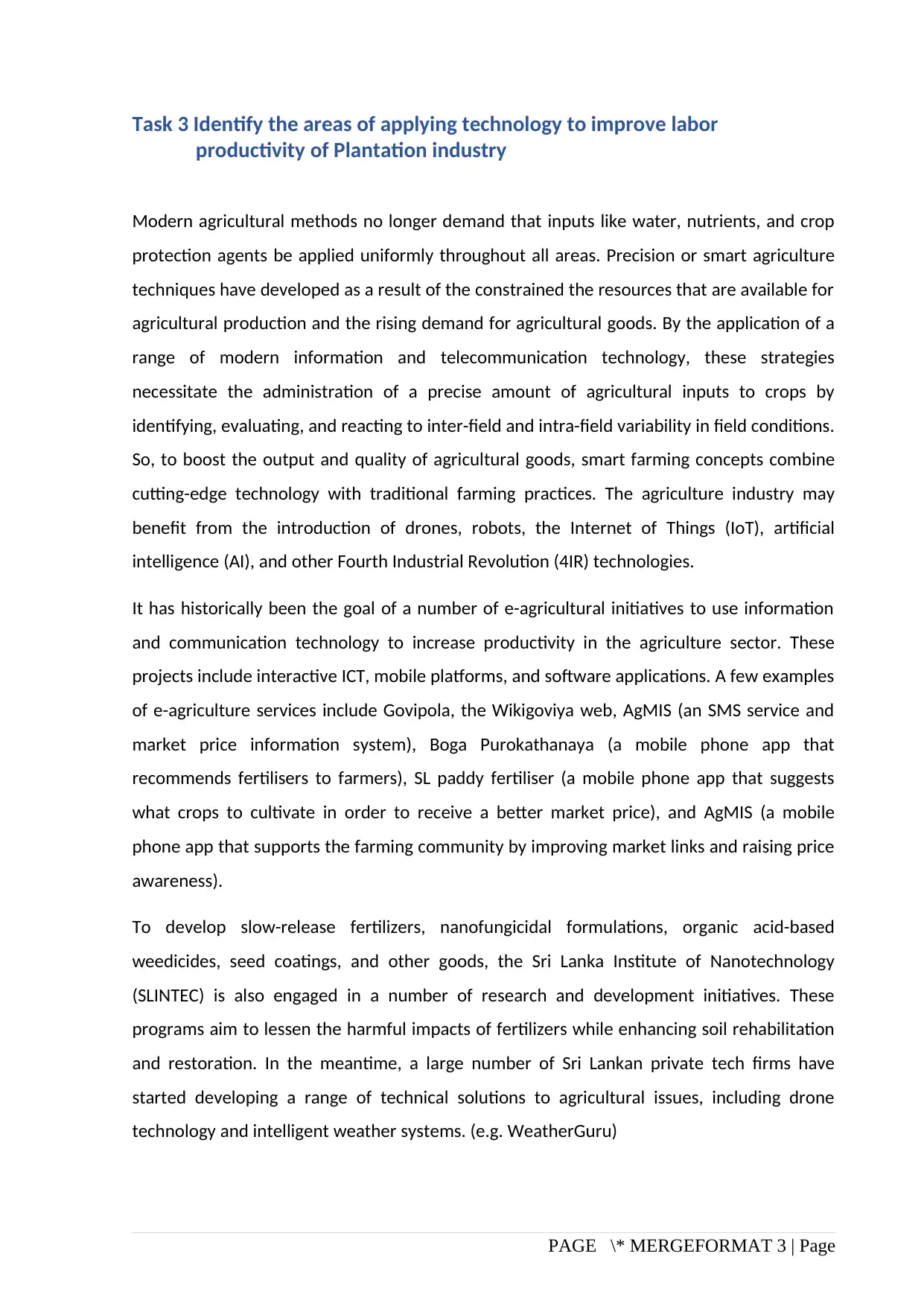
Task 3 Identify the areas of applying technology to improve labor
productivity of Plantation industry
Modern agricultural methods no longer demand that inputs like water, nutrients, and crop
protection agents be applied uniformly throughout all areas. Precision or smart agriculture
techniques have developed as a result of the constrained the resources that are available for
agricultural production and the rising demand for agricultural goods. By the application of a
range of modern information and telecommunication technology, these strategies
necessitate the administration of a precise amount of agricultural inputs to crops by
identifying, evaluating, and reacting to inter-field and intra-field variability in field conditions.
So, to boost the output and quality of agricultural goods, smart farming concepts combine
cutting-edge technology with traditional farming practices. The agriculture industry may
benefit from the introduction of drones, robots, the Internet of Things (IoT), artificial
intelligence (AI), and other Fourth Industrial Revolution (4IR) technologies.
It has historically been the goal of a number of e-agricultural initiatives to use information
and communication technology to increase productivity in the agriculture sector. These
projects include interactive ICT, mobile platforms, and software applications. A few examples
of e-agriculture services include Govipola, the Wikigoviya web, AgMIS (an SMS service and
market price information system), Boga Purokathanaya (a mobile phone app that
recommends fertilisers to farmers), SL paddy fertiliser (a mobile phone app that suggests
what crops to cultivate in order to receive a better market price), and AgMIS (a mobile
phone app that supports the farming community by improving market links and raising price
awareness).
To develop slow-release fertilizers, nanofungicidal formulations, organic acid-based
weedicides, seed coatings, and other goods, the Sri Lanka Institute of Nanotechnology
(SLINTEC) is also engaged in a number of research and development initiatives. These
programs aim to lessen the harmful impacts of fertilizers while enhancing soil rehabilitation
and restoration. In the meantime, a large number of Sri Lankan private tech firms have
started developing a range of technical solutions to agricultural issues, including drone
technology and intelligent weather systems. (e.g. WeatherGuru)
PAGE \* MERGEFORMAT 3 | Page
productivity of Plantation industry
Modern agricultural methods no longer demand that inputs like water, nutrients, and crop
protection agents be applied uniformly throughout all areas. Precision or smart agriculture
techniques have developed as a result of the constrained the resources that are available for
agricultural production and the rising demand for agricultural goods. By the application of a
range of modern information and telecommunication technology, these strategies
necessitate the administration of a precise amount of agricultural inputs to crops by
identifying, evaluating, and reacting to inter-field and intra-field variability in field conditions.
So, to boost the output and quality of agricultural goods, smart farming concepts combine
cutting-edge technology with traditional farming practices. The agriculture industry may
benefit from the introduction of drones, robots, the Internet of Things (IoT), artificial
intelligence (AI), and other Fourth Industrial Revolution (4IR) technologies.
It has historically been the goal of a number of e-agricultural initiatives to use information
and communication technology to increase productivity in the agriculture sector. These
projects include interactive ICT, mobile platforms, and software applications. A few examples
of e-agriculture services include Govipola, the Wikigoviya web, AgMIS (an SMS service and
market price information system), Boga Purokathanaya (a mobile phone app that
recommends fertilisers to farmers), SL paddy fertiliser (a mobile phone app that suggests
what crops to cultivate in order to receive a better market price), and AgMIS (a mobile
phone app that supports the farming community by improving market links and raising price
awareness).
To develop slow-release fertilizers, nanofungicidal formulations, organic acid-based
weedicides, seed coatings, and other goods, the Sri Lanka Institute of Nanotechnology
(SLINTEC) is also engaged in a number of research and development initiatives. These
programs aim to lessen the harmful impacts of fertilizers while enhancing soil rehabilitation
and restoration. In the meantime, a large number of Sri Lankan private tech firms have
started developing a range of technical solutions to agricultural issues, including drone
technology and intelligent weather systems. (e.g. WeatherGuru)
PAGE \* MERGEFORMAT 3 | Page
⊘ This is a preview!⊘
Do you want full access?
Subscribe today to unlock all pages.

Trusted by 1+ million students worldwide
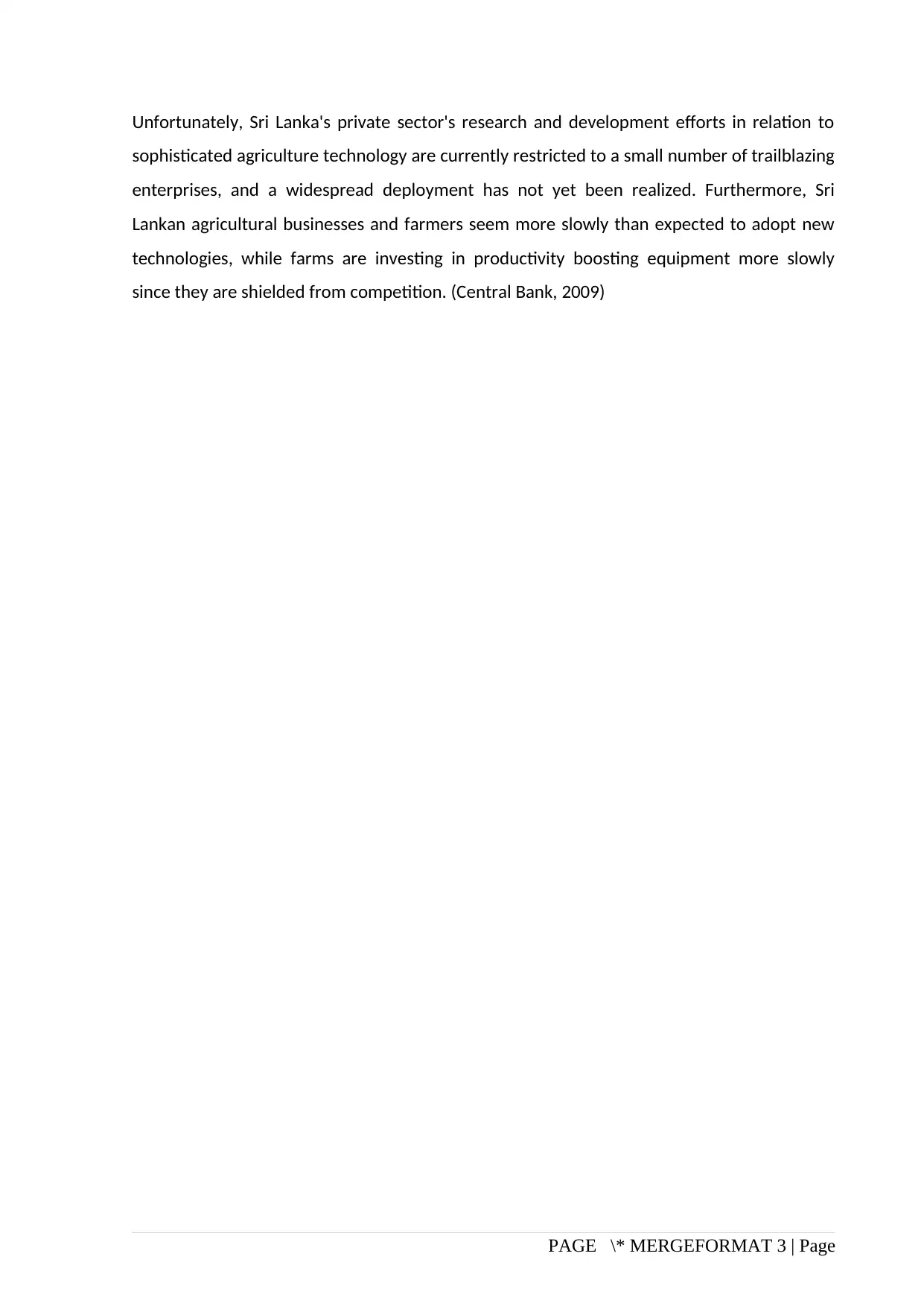
Unfortunately, Sri Lanka's private sector's research and development efforts in relation to
sophisticated agriculture technology are currently restricted to a small number of trailblazing
enterprises, and a widespread deployment has not yet been realized. Furthermore, Sri
Lankan agricultural businesses and farmers seem more slowly than expected to adopt new
technologies, while farms are investing in productivity boosting equipment more slowly
since they are shielded from competition. (Central Bank, 2009)
PAGE \* MERGEFORMAT 3 | Page
sophisticated agriculture technology are currently restricted to a small number of trailblazing
enterprises, and a widespread deployment has not yet been realized. Furthermore, Sri
Lankan agricultural businesses and farmers seem more slowly than expected to adopt new
technologies, while farms are investing in productivity boosting equipment more slowly
since they are shielded from competition. (Central Bank, 2009)
PAGE \* MERGEFORMAT 3 | Page
Paraphrase This Document
Need a fresh take? Get an instant paraphrase of this document with our AI Paraphraser
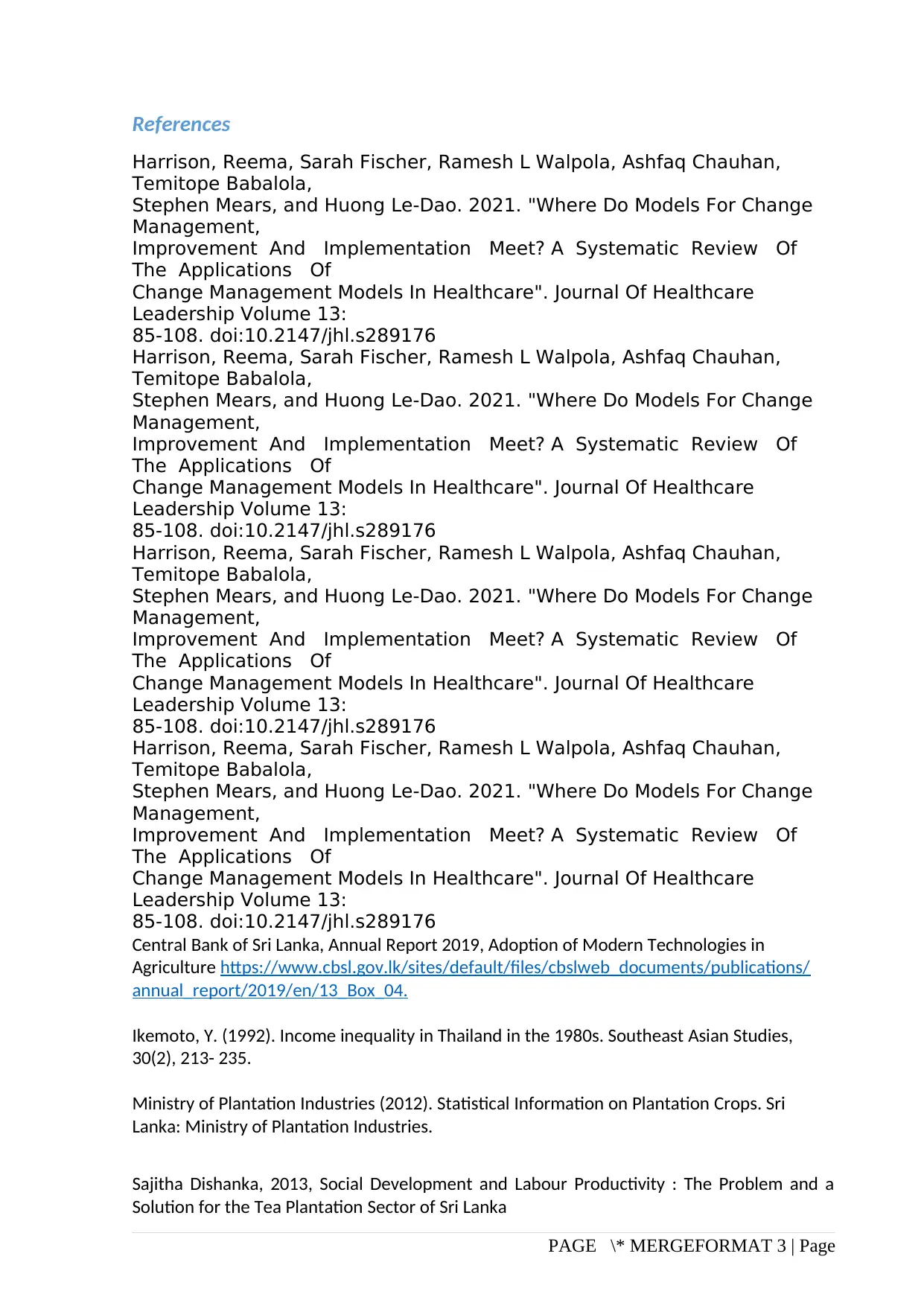
References
Harrison, Reema, Sarah Fischer, Ramesh L Walpola, Ashfaq Chauhan,
Temitope Babalola,
Stephen Mears, and Huong Le-Dao. 2021. "Where Do Models For Change
Management,
Improvement And Implementation Meet? A Systematic Review Of
The Applications Of
Change Management Models In Healthcare". Journal Of Healthcare
Leadership Volume 13:
85-108. doi:10.2147/jhl.s289176
Harrison, Reema, Sarah Fischer, Ramesh L Walpola, Ashfaq Chauhan,
Temitope Babalola,
Stephen Mears, and Huong Le-Dao. 2021. "Where Do Models For Change
Management,
Improvement And Implementation Meet? A Systematic Review Of
The Applications Of
Change Management Models In Healthcare". Journal Of Healthcare
Leadership Volume 13:
85-108. doi:10.2147/jhl.s289176
Harrison, Reema, Sarah Fischer, Ramesh L Walpola, Ashfaq Chauhan,
Temitope Babalola,
Stephen Mears, and Huong Le-Dao. 2021. "Where Do Models For Change
Management,
Improvement And Implementation Meet? A Systematic Review Of
The Applications Of
Change Management Models In Healthcare". Journal Of Healthcare
Leadership Volume 13:
85-108. doi:10.2147/jhl.s289176
Harrison, Reema, Sarah Fischer, Ramesh L Walpola, Ashfaq Chauhan,
Temitope Babalola,
Stephen Mears, and Huong Le-Dao. 2021. "Where Do Models For Change
Management,
Improvement And Implementation Meet? A Systematic Review Of
The Applications Of
Change Management Models In Healthcare". Journal Of Healthcare
Leadership Volume 13:
85-108. doi:10.2147/jhl.s289176
Central Bank of Sri Lanka, Annual Report 2019, Adoption of Modern Technologies in
Agriculture https://www.cbsl.gov.lk/sites/default/files/cbslweb_documents/publications/
annual_report/2019/en/13_Box_04.
Ikemoto, Y. (1992). Income inequality in Thailand in the 1980s. Southeast Asian Studies,
30(2), 213- 235.
Ministry of Plantation Industries (2012). Statistical Information on Plantation Crops. Sri
Lanka: Ministry of Plantation Industries.
Sajitha Dishanka, 2013, Social Development and Labour Productivity : The Problem and a
Solution for the Tea Plantation Sector of Sri Lanka
PAGE \* MERGEFORMAT 3 | Page
Harrison, Reema, Sarah Fischer, Ramesh L Walpola, Ashfaq Chauhan,
Temitope Babalola,
Stephen Mears, and Huong Le-Dao. 2021. "Where Do Models For Change
Management,
Improvement And Implementation Meet? A Systematic Review Of
The Applications Of
Change Management Models In Healthcare". Journal Of Healthcare
Leadership Volume 13:
85-108. doi:10.2147/jhl.s289176
Harrison, Reema, Sarah Fischer, Ramesh L Walpola, Ashfaq Chauhan,
Temitope Babalola,
Stephen Mears, and Huong Le-Dao. 2021. "Where Do Models For Change
Management,
Improvement And Implementation Meet? A Systematic Review Of
The Applications Of
Change Management Models In Healthcare". Journal Of Healthcare
Leadership Volume 13:
85-108. doi:10.2147/jhl.s289176
Harrison, Reema, Sarah Fischer, Ramesh L Walpola, Ashfaq Chauhan,
Temitope Babalola,
Stephen Mears, and Huong Le-Dao. 2021. "Where Do Models For Change
Management,
Improvement And Implementation Meet? A Systematic Review Of
The Applications Of
Change Management Models In Healthcare". Journal Of Healthcare
Leadership Volume 13:
85-108. doi:10.2147/jhl.s289176
Harrison, Reema, Sarah Fischer, Ramesh L Walpola, Ashfaq Chauhan,
Temitope Babalola,
Stephen Mears, and Huong Le-Dao. 2021. "Where Do Models For Change
Management,
Improvement And Implementation Meet? A Systematic Review Of
The Applications Of
Change Management Models In Healthcare". Journal Of Healthcare
Leadership Volume 13:
85-108. doi:10.2147/jhl.s289176
Central Bank of Sri Lanka, Annual Report 2019, Adoption of Modern Technologies in
Agriculture https://www.cbsl.gov.lk/sites/default/files/cbslweb_documents/publications/
annual_report/2019/en/13_Box_04.
Ikemoto, Y. (1992). Income inequality in Thailand in the 1980s. Southeast Asian Studies,
30(2), 213- 235.
Ministry of Plantation Industries (2012). Statistical Information on Plantation Crops. Sri
Lanka: Ministry of Plantation Industries.
Sajitha Dishanka, 2013, Social Development and Labour Productivity : The Problem and a
Solution for the Tea Plantation Sector of Sri Lanka
PAGE \* MERGEFORMAT 3 | Page
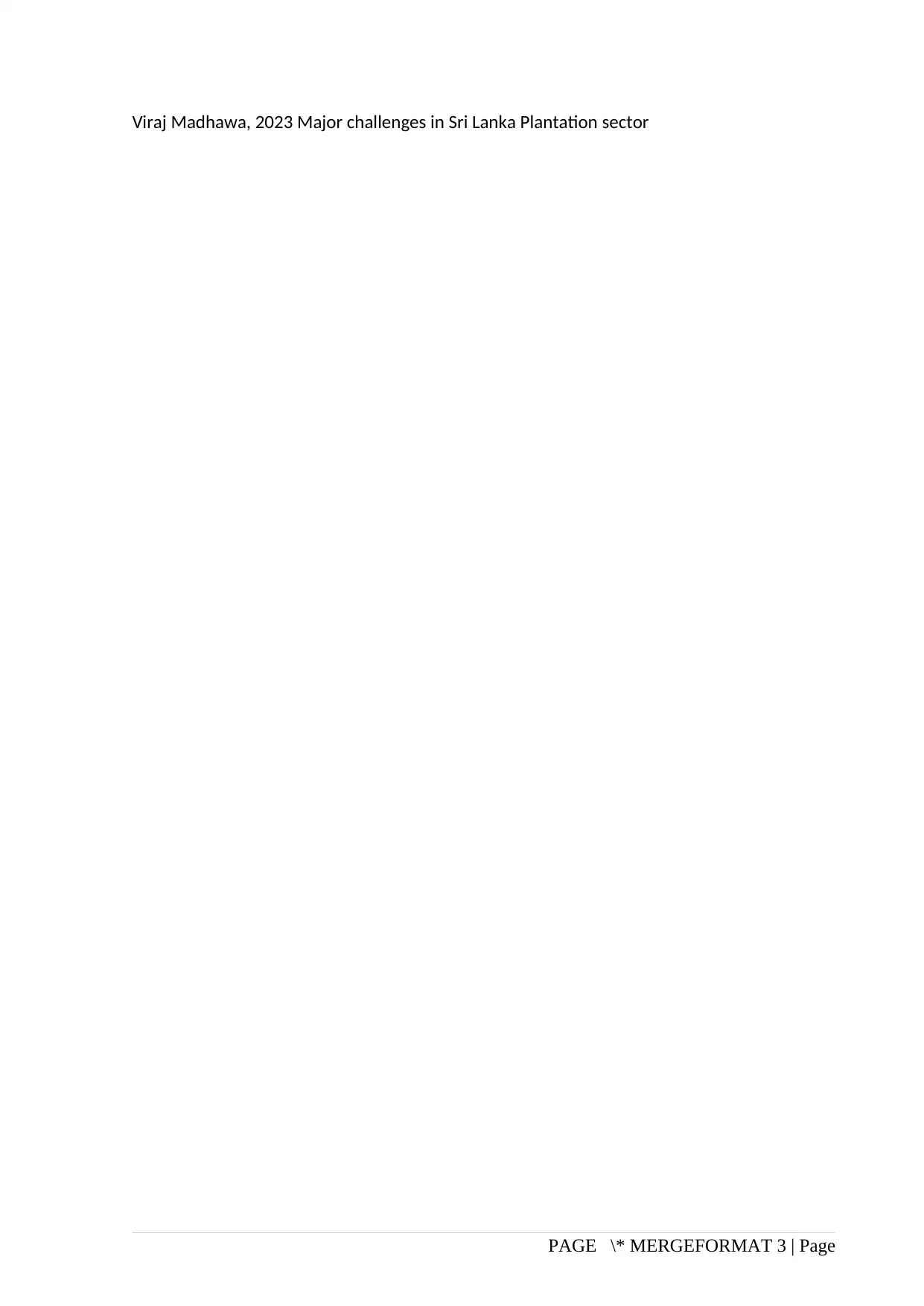
Viraj Madhawa, 2023 Major challenges in Sri Lanka Plantation sector
PAGE \* MERGEFORMAT 3 | Page
PAGE \* MERGEFORMAT 3 | Page
⊘ This is a preview!⊘
Do you want full access?
Subscribe today to unlock all pages.

Trusted by 1+ million students worldwide
1 out of 9
Related Documents
Your All-in-One AI-Powered Toolkit for Academic Success.
+13062052269
info@desklib.com
Available 24*7 on WhatsApp / Email
![[object Object]](/_next/static/media/star-bottom.7253800d.svg)
Unlock your academic potential
Copyright © 2020–2026 A2Z Services. All Rights Reserved. Developed and managed by ZUCOL.





